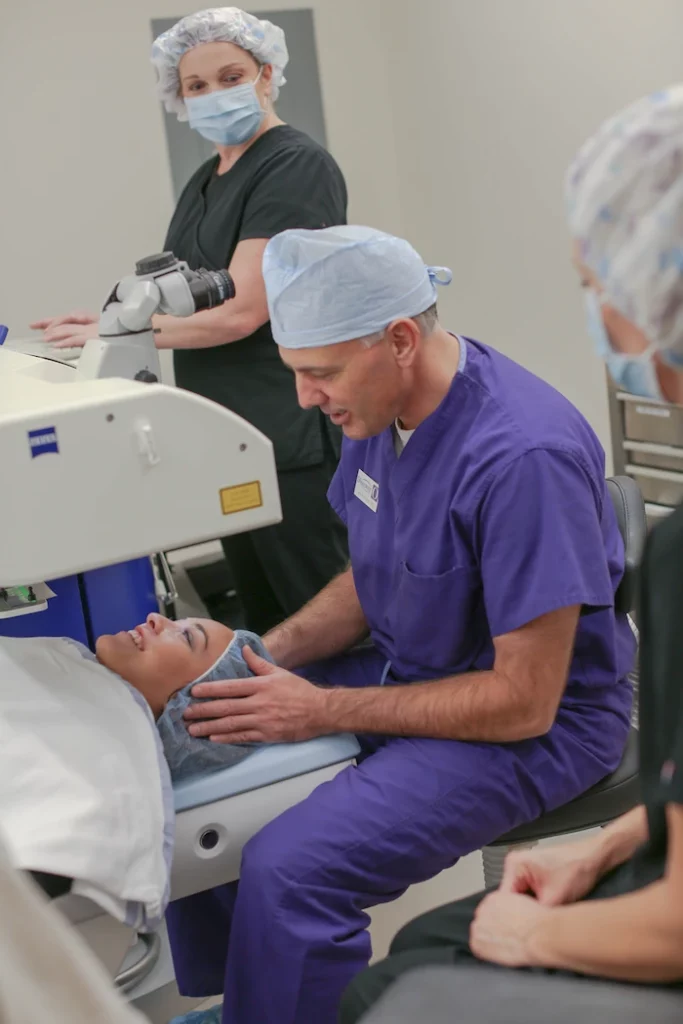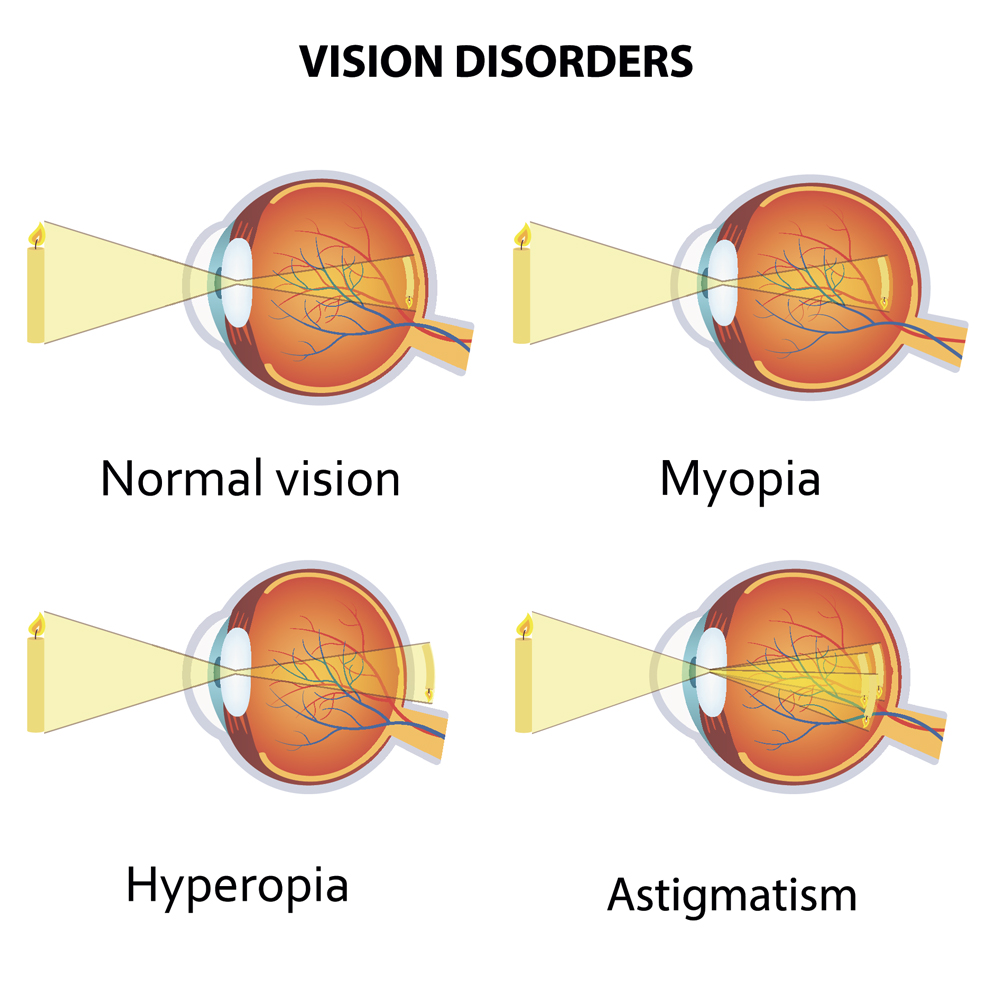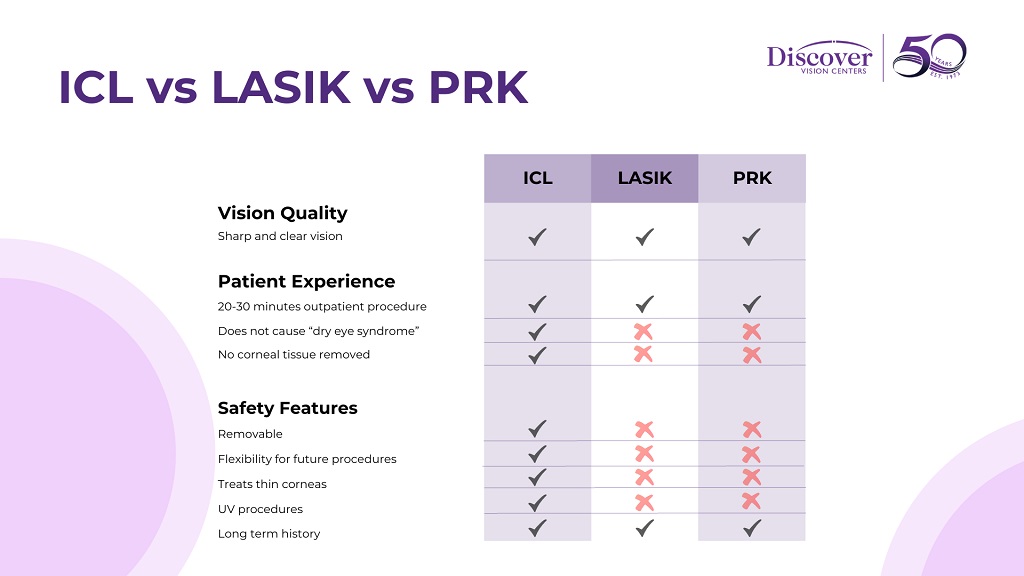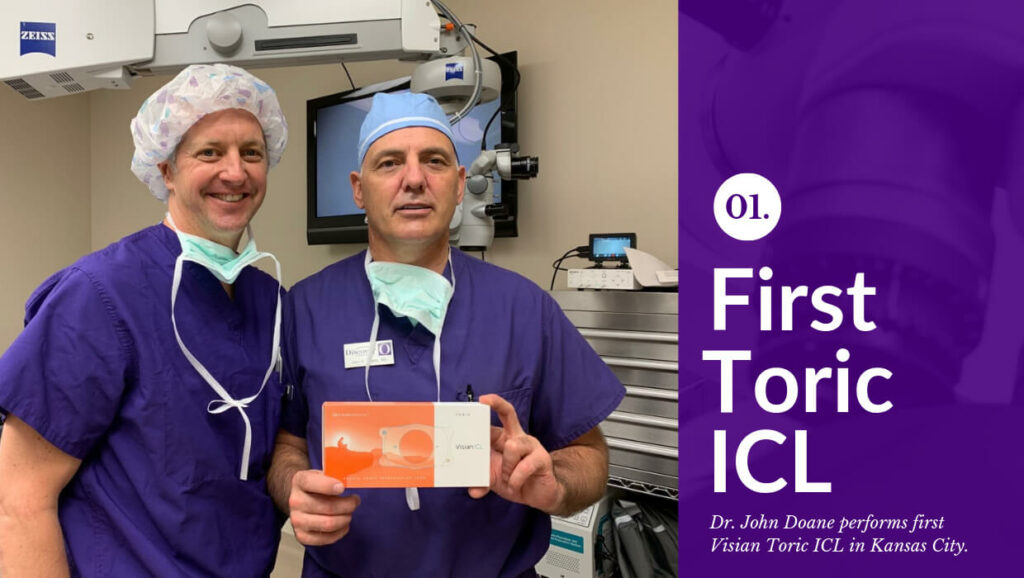

The implantable collamer lens (ICL) or implantable contact lens is an innovative alternative to LASIK, SMILE, and PRK. It is ideal for high nearsightedness, with or without astigmatism, and thinner corneas. The unique design of the EVO ICL™ allows for precise vision correction, making it an advanced solution with exceptional results.
An implantable collamer lens (ICL) is a type of corrective vision implant used to treat refractive errors such as myopia (nearsightedness) and astigmatism. Unlike traditional contact lenses that sit on the surface of the eye, ICLs are surgically implanted inside the eye to correct your vision. ICL eye surgery is an alternative procedure to other refractive surgeries such as LASIK, SMILE or PRK.
ICLs are made of a biocompatible material called collamer, which combines the benefits of both contact lenses and intraocular lenses. Collamer is a soft, flexible material that interacts harmoniously with the eye’s natural structures, reducing the risk of complications.
The implantation procedure involves creating a small incision in the cornea to insert the folded ICL, which is then positioned behind the iris and in front of the eye’s natural lens. Once in place, the lens unfolds and remains permanently implanted.
One of the key advantages of ICLs is their ability to provide exceptional visual outcomes. They can correct a wide range of refractive errors and offer high-definition vision. Additionally, the procedure is reversible, as the ICL can be removed or replaced if necessary.
ICLs have demonstrated excellent safety and efficacy in clinical studies, with high patient satisfaction rates. You may have seen recently that two of the Jonas Brothers had EVO ICL surgery and have been thrilled with the results. ICL surgery can provide long-term vision correction, reducing or eliminating the need for glasses or contact lenses.

One of the significant advantages of the ICL is its short recovery period. Many patients experience a substantial improvement in their vision within a day or a week after the surgery. This rapid recovery time contributes to the growing popularity of ICL surgery as a preferred option for individuals seeking a swift and effective treatment for nearsightedness and astigmatism.
Additional benefits of EVO ICL surgery:
As with any surgical procedure, there are potential risks and complications associated with ICL implantation. It is important to consult with an eye care professional to determine if you are a suitable candidate and to discuss the potential benefits and risks of the procedure.
Implantable collamer lens surgery is a vision correction procedure that effectively treats nearsightedness by inserting a specialized lens into the eye, improving visual acuity and reducing dependency on glasses or contact lenses.
The implantable collamer lens (ICL) is a remarkable solution for astigmatism correction. Through its precise implantation, it effectively reduces astigmatism, leading to clearer and sharper vision.
Currently, in the United States, the implantable collamer lens (ICL) is not approved for the correction of hyperopia. However, it remains an effective option for treating nearsightedness and astigmatism.


ICL corrective eye surgery may be an option for patients who do not qualify for LASIK because of dry eyes, thin corneas or if their correction is beyond what corneal surgeries can achieve. The goal with ICL surgery is to reduce if not eliminate your dependence on glasses or contact lenses. A thorough eye exam is needed to make sure one is a good candidate for surgery.
Potential candidates for ICL surgery include those who:
The first step is to schedule a consultation to find out if the EVO Visian ICL or toric implantable collamer lens is the best solution for you. During your consultation, a thorough eye exam will be completed. You will be educated about what to expect and the doctor / surgeon will determine if your expectations can be met with the procedure. Once this is determined, the process is straight-forward.
Steps to prepare for ICL surgery:
The procedure is performed on an outpatient basis and takes about 20 minutes. Topical numbing drops and oral sedation are typical. Some patients may benefit from IV sedation for additional relaxation, however, ICL surgery is quick and should be near or totally painless. The surgery is performed in one of our state-of-the-art operating rooms. After your procedure, post-operative instructions regarding medications and activity restrictions will be discussed.
After Visian ICL surgery, a short recovery period is typically expected. Most patients experience improved vision within a few days, with minimal discomfort. The ICL provides long-term results, effectively correcting vision and reducing dependence on glasses or contact lenses. Patients often achieve excellent visual acuity, sharper focus, and enhanced quality of life, enjoying clear vision for years to come. Regular follow-up visits ensure continued success and satisfaction.
LASIK & SMILE provide quick results and a rapid recovery, while PRK is a suitable choice for individuals with thinner corneas or specific eye conditions, but requires a longer healing time. EVO ICL is a procedure where a corrective lens is surgically implanted inside the eye to correct vision. ICL offers a reversible option for correcting a wide range of refractive errors, with excellent visual outcomes.
When comparing vision correction procedures, it is important to consult an eye care professional who can evaluate your specific needs.


ICL surgery is seen as an elective procedure which is not covered by insurance. Your insurance may offer a discount, but you should plan on the majority, if not all of the “upgrade” as an out-of-pocket expense. Discover Vision has several options to help make implantable collamer lenses more affordable. We offer “See Today, Pay Later” financing through CareCredit, subject to credit approval. We also encourage you to use FSA and HSA (flexible spending and health savings accounts) to pay for your procedure with tax-free dollars.
Dr. John Doane has been actively involved in research and development and has been implanting the ICL since 2000. As the leader of our Refractive team, Dr. Doane has followed the evolution of the technology, performing toric ICL surgery and EVO ICL procedures. The evolution of the ICL first gained FDA approval in 2005 and has continued to refine and enhance technology of the lens design over the past few decades. EVO is the latest advancement in ICL surgery, gaining FDA approval in 2022, and we believe it is even safer and more convenient for patients than prior techniques.

Dr. Doane is board certified by the American Board of Ophthalmology. He is the past President and Chairman of the Board for the American / European Congress of Ophthalmic Surgery. He is an active lecturer and writer on refractive surgery topics in the US and Internationally.
The first step is to schedule a consultation for ICL surgery with Dr. Doane and his team. These consultations are performed virtually or in-office with three refractive optometrists that are part of the Discover Vision Refractive team:
ICL surgery is universally successful in that a patient will not require another surgery as their result is satisfactory. Occasionally a patient may need a refinement surgery to correct any residual correction. This is likely to occur 1% or less depending on the clinic and doctor.
ICL surgery itself is done in 15 to 30 minutes but its results will last to the point a person develops cataract. For most people with cataract formation, their vision will change simply due to the cataract.
Yes, ICL (Implantable Collamer Lens) surgery is considered a permanent vision correction procedure. The ICL is an implant that is placed inside the eye to correct refractive errors, such as myopia (nearsightedness) or astigmatism.
Although the ICL is considered permanent, it is removable if needed. However, once the ICL is placed, most patients are happy to keep the lens until they have cataract surgery later in life. When you reach the point of needing cataract surgery, the ICL will be removed and replaced with an intraocular lens or an IOL.
ICL is a surgical procedure, and with any surgical procedure, risks and side effects can occur. Most of these can be overcome or remedied. Some of these risks may include increased intraocular pressure, cataracts, glare, halos, or night vision disturbances. It is essential for patients to discuss these risks with their ophthalmologist before deciding to move forward with ICL surgery.
No, you will not be able to see or feel the ICL due to the location of the implant. The ICL is positioned inside the eye, behind the iris, making it invisible to both the patient and others. It does not cause any discomfort or affect vision perception.